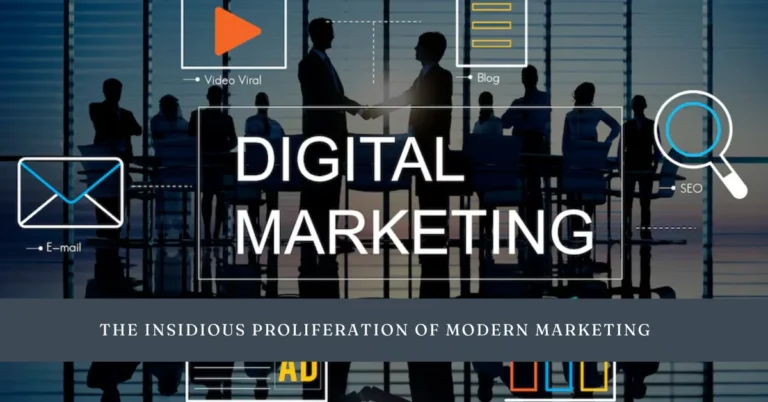Introduction to modern marketing
In an age where information is just a click away, the landscape of marketing has transformed dramatically. Gone are the days of straightforward advertisements that simply informed consumers about products or services. Instead, we find ourselves in the midst of what can only be described as “the insidious proliferation of modern marketing.” This new wave blends cutting-edge technology with psychological tactics designed to capture our attention and influence our decisions without us even realizing it.
Every scroll through social media exposes us to a barrage of carefully curated content aimed at shaping our preferences and buying behaviors. Brands now have access to vast amounts of data, allowing them to target individuals with pinpoint accuracy. But this evolution comes with its own set of challenges—particularly concerning ethics and consumer manipulation.
As we dive deeper into this phenomenon, we’ll explore how these shifts affect both marketers and consumers alike. The question remains: as marketing becomes ever more sophisticated, how do we navigate this complex web while maintaining control over our choices? Let’s unravel these layers together.
The rise of social media and its impact on marketing tactics
Social media has revolutionized the landscape of modern marketing. Brands now have unprecedented access to consumers, allowing them to engage directly and build relationships that were once impossible.
Platforms like Instagram, Facebook, and TikTok create a dynamic environment for content sharing. Marketers adapt their tactics quickly, leveraging trends to capture attention in real time. This immediacy cultivates a sense of urgency among consumers.
User-generated content also plays a vital role. Customers become ambassadors for brands, sharing experiences that resonate with others on social platforms. Authenticity is key; people crave genuine connections over polished advertisements.
Additionally, algorithms dictate visibility on these networks. A company’s success often hinges on its ability to navigate this complex digital ecosystem effectively while appealing to targeted demographics based on preferences and behaviors rather than traditional methods alone.
Utilizing big data and targeted advertising
Big data has transformed the marketing landscape. Companies now have access to vast amounts of information about consumer behavior and preferences. This wealth of data enables them to create highly targeted advertising campaigns.
With algorithms analyzing user interactions in real-time, brands can anticipate needs before consumers even express them. Personalized ads appear seamlessly in feeds, making them feel less intrusive while increasing effectiveness.
However, this precision comes with a price. Consumers often remain unaware of how their online activities are tracked and analyzed. The line between helpful recommendations and invasive surveillance blurs.
Targeted advertising can lead to echo chambers where individuals only see content that reinforces existing beliefs or desires. As appealing as personalization is, it raises questions about authenticity and autonomy in our choices as consumers.
Navigating this intricate web becomes challenging when every click shapes future experiences tailored just for you.
The ethical implications of modern marketing
Modern marketing often blurs the lines of ethics. It’s easy to manipulate emotions and desires through targeted ads that know users better than they know themselves.
Data collection practices raise concerns about privacy. Many consumers unknowingly consent to their information being harvested for profit. The question then arises: how much should marketers be allowed to invade personal spaces?
The use of fear in advertising is another troubling tactic. Brands may exploit insecurities or societal pressures, pushing people toward purchases as a misguided solution.
Moreover, the pressure on companies to keep up with competitors can lead them down a slippery slope. Unethical tactics might become normalized in pursuit of profit over principle.
As modern marketing continues evolving, it’s crucial for both brands and consumers to address these ethical dilemmas head-on. Transparency and accountability must guide future strategies if we hope to foster trust in this digital landscape.
Consumer manipulation and the dangers of constant exposure to advertisements
Every day, consumers are bombarded with advertisements that invade their personal spaces. This endless stream of marketing messages can lead to desensitization, where individuals no longer notice the subtle tactics aimed at influencing their choices.
Constant exposure creates a false sense of need. Marketers expertly craft narratives that resonate deeply, making products feel essential rather than optional. When repeated enough, these messages shape perceptions and desires in ways we often fail to recognize.
Moreover, the psychological impact is significant. People may experience anxiety or dissatisfaction when they perceive themselves as lacking what marketers promote as necessary for happiness or success.
This manipulation erodes genuine decision-making abilities. Instead of informed choices, many find themselves swept away by trends and fads pushed by relentless advertising streams that prioritize profit over authenticity and consumer well-being.
The role of influencers in modern marketing
Influencers have become a cornerstone of modern marketing. Their ability to connect authentically with audiences sets them apart from traditional advertising methods. People trust recommendations from individuals they follow more than brands themselves.
These influencers curate content that resonates with their followers, often blending products seamlessly into their lifestyles. This organic approach makes marketing feel less intrusive and more relatable.
As a result, brands are increasingly investing in influencer partnerships. They leverage these relationships to tap into niche markets and build credibility quickly. The reach is staggering—one post can expose a product to millions almost instantly.
However, the impact goes both ways. Consumers must navigate this landscape carefully, discerning genuine endorsements from paid promotions. Balancing authenticity and commercial interests may determine an influencer’s longevity in this fast-paced environment.
Strategies for consumers to protect themselves from manipulative marketing tactics
Navigating the world of modern marketing can be overwhelming. Consumers must arm themselves with knowledge and strategies to resist manipulation.
First, become an informed shopper. Research products before making a purchase. Look for reviews from multiple sources to gauge authenticity.
Next, scrutinize advertisements critically. Understand that not everything presented is factual or beneficial. Recognizing persuasive techniques can help you see through the noise.
Consider using ad blockers online as well. These tools limit intrusive ads and give you more control over what you view on your devices.
Additionally, take breaks from social media platforms where advertising often lurks. A distanced perspective helps clear your mind from constant promotional messages.
Cultivate awareness about influencer culture. Follow only those whose values align with yours and who promote transparency in their endorsements. This approach fosters a healthier relationship with consumerism while safeguarding against manipulative tactics.
Conclusion: Finding a balance between effective marketing and ethical practices in the modern world
The landscape of modern marketing is a complex web, entwining creativity with strategy. As consumers navigate this intricate environment, it becomes increasingly important to strike a balance between engaging marketing techniques and ethical considerations.
Brands must reflect on their methods while remaining mindful of the impact they have on individuals and society as a whole. Transparency can build trust, encouraging loyalty without resorting to manipulation.
Consumers also play a critical role in shaping marketing practices. By being aware of the tactics used and demanding accountability from brands, they can influence how companies operate. Knowledge is power; understanding one’s own vulnerabilities makes for more conscious consumption.
As we progress further into an era defined by rapid technological advancements, both marketers and consumers must adapt proactively. The challenge lies in fostering innovation that respects individual autonomy while still driving sales effectively.
This equilibrium will ultimately determine whether the insidious proliferation of modern marketing serves to enhance or hinder our collective experience in today’s digital world.
FAQs
Q: What is the insidious proliferation of modern marketing?
Ans: It refers to the subtle and widespread increase in sophisticated marketing techniques that are more precise and pervasive.
Q: How has modern marketing changed in the digital age?
Ans: Marketing has become more sophisticated, with advanced techniques that focus on precision and subtlety in reaching consumers.
Q: What are some examples of modern marketing tactics?
Ans: Examples include targeted ads, personalized content, and data-driven strategies that influence consumer behavior more subtly.
Q: Why is modern marketing considered “insidious”?
Ans: It’s termed the insidious proliferation of modern marketing due to its subtle, often invasive nature that can influence consumer behavior without overt awareness.
Q: How can businesses adapt to the proliferation of modern marketing?
Ans: Businesses can adapt by understanding these advanced tactics, utilizing data analytics, and maintaining ethical practices in their marketing strategies.

